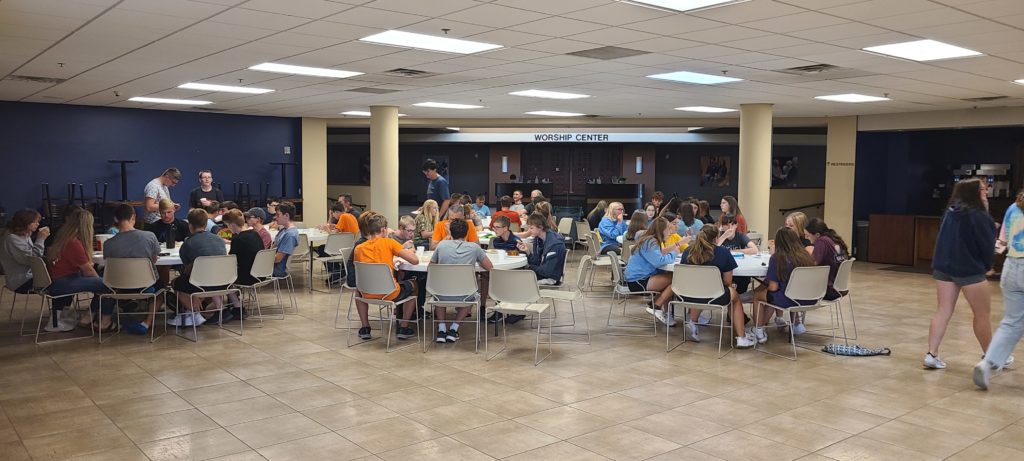Food is mentioned 90 times in the Gospels and another 109 times throughout the Bible. It is a crucial social activity in both the Old and New Testaments. In the first church, the followers devoted themselves to four things: the apostle’s teaching, fellowship, prayer, and the breaking of bread (Acts 2:42-47). This could mean communion or a more broad description is sharing a meal together. This wasn’t once a month potluck it was an everyday thing for the first church.
“They worshiped together at the Temple each day, met in homes for the Lord’s Supper, and shared their meals with great joy and generosity.”
Acts 2:46 NLT
Why are meals so important to the first church?
They followed the example set by Jesus. Jesus spent many times interacting with people around meals. He ate meals with all kinds of people disciples, tax collectors, Pharisees, men, women, and notorious sinners. Jesus even got some pushback with who he ate meals with like Zaccheaus the “notorious sinner” or even Simon the pharisee. The only other miracle besides the resurrection that is mentioned in all four gospels is Jesus feeding the 5,000. Food played a crucial role in the ministry of Jesus. And the first church followed it by sharing meals with each other. Jesus also used part of a meal to symbolize his death and resurrection with communion. So the question is how important are meals to your ministry?
The Value of Food:
Over the years I have come to realize food and particularly sharing of meals can be a valuable element to any youth ministry. A few years ago we added a free meal to our Sunday night high school ministry. I was skeptical at first because I didn’t know if it will work, was worth the hassle, and would my budget support it. So we tried it for one year. I couldn’t believe how it improved the experience of our high schoolers. It changed the whole culture and atmosphere to the night. Sharing a meal made the adult small group leaders feel more connected to their students. It created new connection points to the rest of the church as ministries and families donated or even cooked meals. It also increased attendance and students showing up early or on time so they don’t miss the meal.
So after the trial year, we added 15 minutes to our programming and changed our schedule to make it a permanent part of our ministry. This was a big commitment for us because we have to feed about 90 people each week. That’s a lot of food. And it’s been a crucial element ever since.
Why should you include more meals in your programming? I could say, “because that is what Jesus and the first church did” but I want to share with you four other benefits you might not be aware of for providing more meals with your youth ministry programming.
ONE – It increases engagement and makes for a more friendly environment.
Very few things can provide a natural environment to engagement than sharing a meal together. The people are connecting with each other throughout the whole process, while waiting in line, with the servers serving their food, and at the tables while they eat. It’s psychologically more motivating for humans to open up more if we have something in our hands or if we are eating. So this helps more shy or introverted students to interact than normally would not if they were just standing around waiting for the night to start.
Students who feel welcomed and accepted are the students who come back. It’s that simple. And meals provide an excellent way for students to feel welcomed. There is laughter, discussions, debates, jokes, and everything else that comes with interacting with people when you share a meal together.
TWO – Meals provides ministry opportunities for adult small group leaders to connect with their students.
Some of the best ministry times are the non-programmed moments where the leader and students can just interact and meals provide that better than most. The adult leader has 20-30 minutes of undivided attention with their students. Asking about their day and hearing about the student’s life without it feeling forced or structured like sometimes small group time is.
Adult leaders can ask questions in a more natural way than they could during small group time. They can talk about anything during this time because it’s not programmed. We have seen students brighten up during this time because they get to talk about subjects that they really care about and they have the leader’s undivided attention as well. This also helps with leaders meeting new guests for the first time in an informal setting.
One thing we noticed is our adult leaders have started to show earlier just so they can greet and interact with their students while waiting in line for their food.
THREE – Meals becomes an easy onramp for new guests.
There is something about walking into a room and seeing everyone eating and interacting at tables than standing around in groups. What we found when we added meals made it way easier for guests to get assimilated with the group. We try to foster a culture of “invite to an open seat” where if people see someone standing around looking for a spot they are to invite them to sit at your table. A natural “greeting” ministry started when we started providing meals.
It also was super easy to naturally go around the table and share names for new guests. They are all equal sitting at the round tables so no one needs to stand out if they don’t want to, but also no one can hide either. Meals equalize people and that improves the experience.
Having a meal with another person gives you a shared experience right off the bat, that is more powerful than just sitting next to a person waiting for the night to start. So when a student brings a friend the first thing they do is have that friend get connected with other students in a natural environment. I cannot think of another element that is better than that for getting new guests assimilated into the group and making them feel welcomed.
Our meals have even been a “selling point” when our students invite their friends to youth group.
FOUR – Meals get more people involved outside of the youth ministry including parents
The most difficult yet surprisingly impactful benefit we found was how meals allowed ministries and parents outside the youth ministry to connect and interact with the students. We need almost 90 meals that needs to be provided each week it was too much for one person or group to handle, and our budget certainly couldn’t. So from the beginning, we created a system for groups/ministries/parents to sign up to donate or prepare the food online. This helps us know which week has been planned and what they are bringing so it avoids repetitive meals.
Each summer we do some promoting to get people to sign up for that school year’s meal schedule. We talk to groups like women’s/men’s ministry, adult small groups, Sunday school classes, 65+ groups, and even our lead staff of our church has provided a meal. For parents, we encourage them to “group up” to provide a meal and it helps with parents who are newer to the ministry to get to know other parents!
Most people prepare the meal either beforehand or in our church’s kitchen but a few just donate funds and then we provide a catered meal that week. We encourage ministries and parents to prepare and serve the meal because there is more interaction that way than just a catered meal from a restaurant. We announce who is providing the meal and then pray for them each week. It has even become a promotional tool for our men’s and women’s ministries when they have a big event coming up that students can attend. Most people say one of their favorite parts is actually serving the meal and interacting with the students in line. So we now have several returning ministries and parent groups who sign up each year because of the positive experience they have in serving a meal.
QUICK TIPS ON HOW TO SHARE A MEAL:
- Make the meals free. We don’t charge a meal but have “donation boxes” on each table for students to donate if they wish. Making the meal free helped with the “community” environment we wanted rather than a money-making adventure. We also didn’t feel it was right charging the students if we asked groups to donate the meal each week.
- Sometimes we even give the offering to a local outside food distribution ministry. We have kept our costs low because we get most of our meals donated.
- Have a sign-up for groups to provide meals. A group or person just goes online chooses their week and types what meal they are provided and then someone will follow up with them two days before. We ask that they provide what meal they are sharing so clothes can avoid serving the same thing two weeks in a row. Signupgenius.com is free and we use it alot. But you have to have at least your semester planned on which nights you will be meeting and will need to do some promoting to get things going.
- No Pizza. We ask anyone who donates never to provide pizza as that is always our backup plan in case no one signs up that week or an emergency happens and a group has to back out at the last minute.
- Never post the menu. One thing we learned the hard way was when students started asking “what’s for dinner” beforehand and then determined if they were going to attend based on the menu. We decided a few weeks in that we will no longer post or share what was on the menu because “it’s not about the food it’s about the time together.” So no one even knows what we are eating until they arrive that evening. That has helped greatly with our friendly environment and cut down on the entitled factor.
- Potluck once a semester. To give our serving teams a break and help the community feel we have a potluck meal once a semester. We usually divide up the grades on what to bring as a guide but people really can bring anything. These have been some of the best meals because people go all out and then we talk and share about what all people have brought. We have some really good student cooks!
- Freshmen & sophomore – main dish
- Junior & senior – side dish
- Adult leaders – dessert
- Round is usually better. Try to sit at round tables where everyone can sit together if you can. We intentionally set up tables (see below) all in the same room rather than letting the students just find anywhere to sit. This encourages interactions and diminishes cliques.
- Send thank-you notes. Every time a group or ministry provides a meal they get a handwritten note thanking them for serving the student ministry. This is a crucial step that should never be forgotten.





